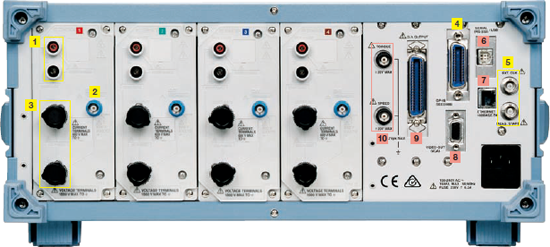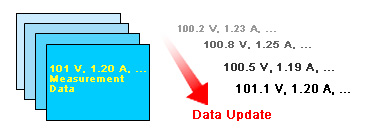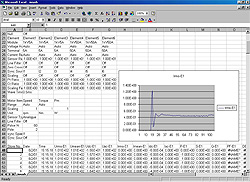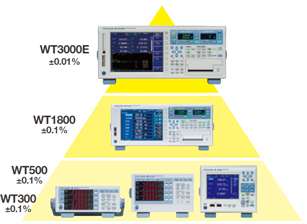PRECISION POWER ANALYZER WT3000E
Devices such as solar inverters are already working at overall efficiencies of 90 to 96%. To increase the efficiency, even by few decimal points, is a challenging and important goal for the manufacturers. As the world’s most accurate power analyzer, the WT3000E provides the necessary levels of precision to truly confirm the smallest improvements in efficiency.
With basic power accuracy of ±0.01% reading, DC and 0.1 Hz-1 MHz measurement bandwidths, and up to four input elements, the WT3000E provides higher-accuracy measurement of I/O efficiency.
- Basic power accuracy: 0.01% of reading
- Both 2 A and 30 A input elements can be installed in a single unit
- Good readability: The large, 8.4-inch LCD and the range indicator LEDs
- Simultaneous measurement with 2 units (8 power input elements)
- Store function: 50 ms data storing interval
- Interface: GP-IB, Ethernet, RS-232 and USB
- Advanced computation function: Waveform computation, FFT analysis, waveform sampling data saving.
- The latest IEC61000-3-2 and IEC61000-3-12: Harmonic measurement
- The latest IEC61000-3-3 and IEC61000-3-11: Voltage fluctuation / flicker measurement
|
Yokogawa's highest-precision power analyzer The WT3000E has the highest precision of all the Yokogawa power analyzers in the WT series. The models in the WT series are designed to meet a wide variety of user needs. The WT300/WT500 series is a high price-performance series which is very popular in production line applications. The WT1800 allows measurement data to be viewed in a variety of ways, including numerical value display, waveform display, and trend display capabilities.
|
Select the model most suited to your measurement needs
-
High accuracy and wide frequency range
Basic power accuracy
±(0.01% of reading + 0.03% of range)
frequency range
DC, 0.1 Hz to 1 MHz -
Low power factor error
Power factor error when cosø=0
0.03% of S
S is reading value of apparent power
ø is phase angle between voltage and current -
Current range
Direct input
0.5/1/2/5/10/20/30 [A] or 5/10/20/50/100/200/500 [mA], 1/2 [A]
*2A and 30A input elements can be installed together in a unit. -
External input
50m/100m/200m/500m/1/2/5/10 [V]*
-
Voltage range
15/30/60/100/150/300/600/1000 [V]
* Voltage range and current range are for crest factor 3- 1000 [Vrms] Continuous maximum common mode voltage (50/60 Hz)
- Data Update rate: 50 ms to 20 sec
- Effective input range: 1% to 130%
- Simultaneously measurement with 2 Units
Motor Evaluation Option (/MTR)
|
 |
Rear Panel

| Standard Features | Optional Features |
|
|
Characteristics
Example of basic characteristics showing the WT3000E’s high precision and excellent stability

Supports Crest Factor 6
| The crest factor is the ratio of the waveform peak value and the RMS value. |
 |

* However, the peak value of the measured signal must be less than or equal to the continuous maximum allowed input
* The crest factor on a power meter is specified by how many times peak input value is allowed relative to rated input value. Even if some measured signals exist whose crest factors are larger than the specifications of the instrument (the crest factor standard at the rated input), you can measure signals having crest factors larger than the specifications by setting a measurement range that is large relative to the measured signal. For example, even if you set CF = 3, CF5 or higher measurements are possible as long as the measured value (RMS) is 60% or less than the measuring range. Also, for a setting of CF = 3, measurements of CF = 300 are possible with the minimum effective input (1% of measuring range).
Store Function (Comes Standard with WT3000E)
Voltage, current, power, and other measured data can be stored to the unit's approximately thirty megabytes of internal memory. These data can be saved in binary or ASCII format on a PC card or USB memory*.
* The USB port (for peripherals) comes with the /C5 option.

Each measured item can be stored every data update interval. You can specify to store only the desired measured items, thus saving memory.
|
Files saved in ASCII format can be opened in general-purpose applications such as Excel allowing display of data in graphs. * Please note that data saved in binary format can only be manipulated using dedicated software to be made available by Yokogawa. |
 Excel Example |







